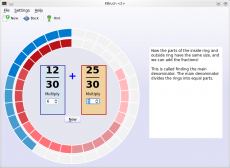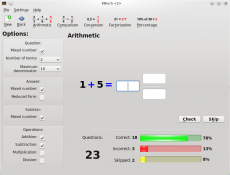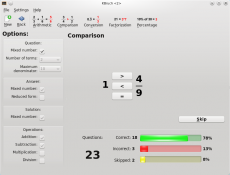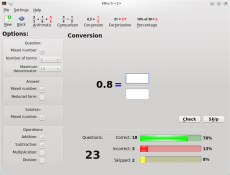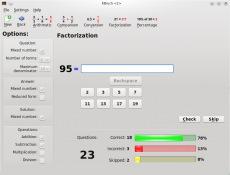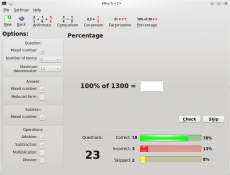KBruch: Difference between revisions
Appearance
Pipesmoker (talk | contribs) |
m fix typos |
||
| Line 15: | Line 15: | ||
KBruch offers 5 different exercise types. | KBruch offers 5 different exercise types. | ||
# '''Arithmetic''' - in this exercise you have to solve a given fraction task. You have to enter numerator and denominator. This is the main exercise. The difficulty of this task can be influenced by the user. The user can decide if he wants to solve tasks with addition/ | # '''Arithmetic''' - in this exercise you have to solve a given fraction task. You have to enter numerator and denominator. This is the main exercise. The difficulty of this task can be influenced by the user. The user can decide if he wants to solve tasks with addition/subtraction and/or multiplication/division. Also he can set the number of fractions and the maximum size of the main denominator. | ||
# '''Comparison''' - in this exercise you have to compare the size of 2 given fractions. | # '''Comparison''' - in this exercise you have to compare the size of 2 given fractions. | ||
# '''Conversion''' - in this exercise you have to convert a given number into a fraction. | # '''Conversion''' - in this exercise you have to convert a given number into a fraction. | ||
| Line 25: | Line 25: | ||
{| cellpadding="5" | {| cellpadding="5" | ||
| [[Image:kbruch-learning.png|230px|thumb]] | | [[Image:kbruch-learning.png|230px|thumb]] | ||
| The main goal in '''learning mode''' is to make the parts of the inner ring and the outer ring have the same size. The | | The main goal in '''learning mode''' is to make the parts of the inner ring and the outer ring have the same size. The corresponding fractions can be expanded using spin boxes. The learner can get advice reading the hint box on the right. | ||
|- | |- | ||
| [[Image:kbruch-common.png|230px|thumb]] | | [[Image:kbruch-common.png|230px|thumb]] | ||
| Line 40: | Line 40: | ||
|- | |- | ||
| [[Image:kbruch-percentage.png|230px|thumb]] | | [[Image:kbruch-percentage.png|230px|thumb]] | ||
| In this screenshot you can see the exercise '''Percentage.''' The user has to calculate parts of a number. The numbers are that easy so that no pocket | | In this screenshot you can see the exercise '''Percentage.''' The user has to calculate parts of a number. The numbers are that easy so that no pocket calculator should be necessary. | ||
|} | |} | ||
Revision as of 14:28, 31 May 2010
Template:I18n/Language Navigation Bar
| KBruch is a small program to practice calculating with fractions. |
KBruch is part of the KDE Education Project.
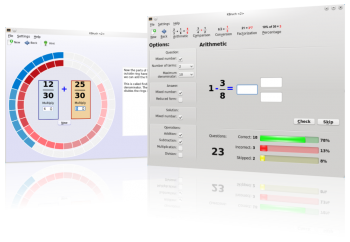
Features
KBruch offers 5 different exercise types.
- Arithmetic - in this exercise you have to solve a given fraction task. You have to enter numerator and denominator. This is the main exercise. The difficulty of this task can be influenced by the user. The user can decide if he wants to solve tasks with addition/subtraction and/or multiplication/division. Also he can set the number of fractions and the maximum size of the main denominator.
- Comparison - in this exercise you have to compare the size of 2 given fractions.
- Conversion - in this exercise you have to convert a given number into a fraction.
- Factorization - in this exercise you have to factorize a given number into its prime factors. Factorization is important while finding the main denominator of 2 fractions.
- Percentage - in this exercise you have to calculate easy parts of numbers given as percentages.


